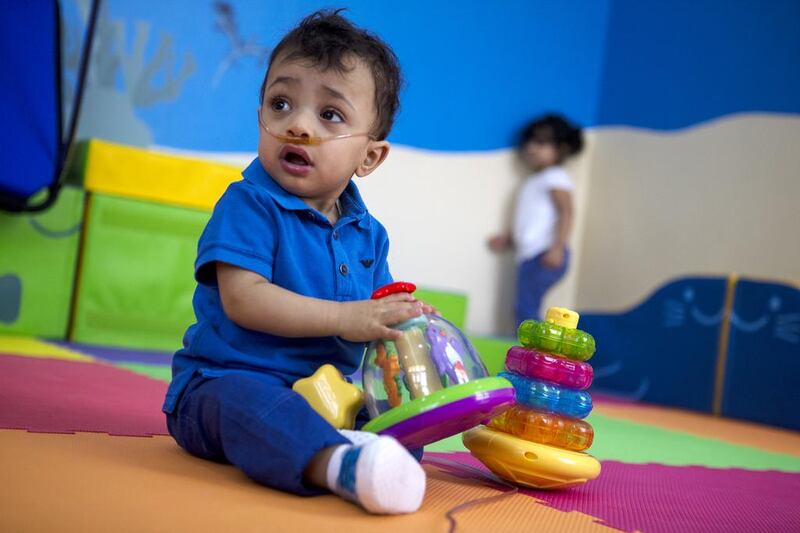AL AIN // When Abdullah Ali Al Dhaheri was born at 23 weeks, weighing just half a kilogram, he was so tiny he could fit in the palm of his mother’s hand.
Doctors, who had spent a week trying to delay the birth, told S Al Mahri to expect the worst.
“I was in hospital and they tried to stop it. They told me he might not be alive. It was a very difficult situation. It was horrible,” said the Emirati, who is from Al Ain.
If he did survive, against all odds, doctors warned that the physical and mental handicaps of such a premature birth could be serious and life-lasting.
“They were certain he would have some abnormalities to his brain, to his organs,” she said.
But now at 17 months, Abdullah has astounded his doctors and his family by not only surviving but by defying all odds and developing into a normal healthy toddler.
His mother said she never gave up hope since the day Abdullah was born in January last year.
After his delivery, doctors told her that Abdullah had chronic lung disease, leading to oxygen dependency and significant mobility and motor function problems.
The tiny baby spent ten months in hospital reliant on a ventilator while his mother kept a daily vigil by his bedside, praying she would be allowed to take her son home.
“Every time I go with this hope. I said, let me take Abdullah home.”
In November, Ms Al Mahri transferred him to the ProVita long-term facility in Al Ain for more individualised and personal care.
Within weeks he was flourishing, she said. “He wanted to play. He was smiling all the time. Here they appreciated Abdullah’s situation.”
Doctors managed to wean Abdullah off the ventilator and the care team spent hours a day improving his mobility and motor functions.
Abdullah’s physical therapy focused on trunk control, which provides the stability to sit up by yourself, and balance.
Through occupational therapy he developed the use of his arms and hands to support, reach, grasp and hold.
Abdullah is now able to roll, sit without support, wave and clap.
One month ago, Ms Al Mahri saw her dream realised when she was finally able to take her son home.
“I cannot explain. I was waiting for this day. But when they told me this, I cried. I had tears of happiness.”
Watching her son gurgle happily as he plays with sisters Hind, 5, and Alyazi, 2, on the huge colourful playmat at the ProVita facility, is a dream Ms Al Mahri never thought possible.
“I am so, so happy. I am grateful for everything.”
While he is about five months behind his peers in terms of development, doctors are hopeful that Abdullah will have no lasting effects of his premature birth.
He still needs a nasal cannula, a device used to deliver oxygen, but should be able to breathe on his own within months.
Dressed in blue shorts and a matching polo shirt, Abdullah zooms plastic balls up and down the mat, drawing a smile from all the staff members at ProVita who crowded into a huge play area to see him.
He is something of a celebrity at the centre, said Michael Davis, chief operating officer at ProVita.
“Usually in medicine we say 24 weeks is the earliest a baby like Abdullah can survive. This is a miracle.
“When I see him like this I think of all the hard work of all of the clinicians and the caregivers here and the many hours his mother sat at his bedside,” Mr Davis said.
“To see him in this condition is overwhelming in some ways. This is what makes exactly what we do worth while.”
The 50-bed centre in Al Ain’s Al Foaa district, which opened a year ago, provides long-term care for patients reliant on ventilators, including those born with degenerative disorders.
It also cares for the victims of accidents, such as car crashes, who will never completely recover from their injuries.
jbell@thenational.ae





